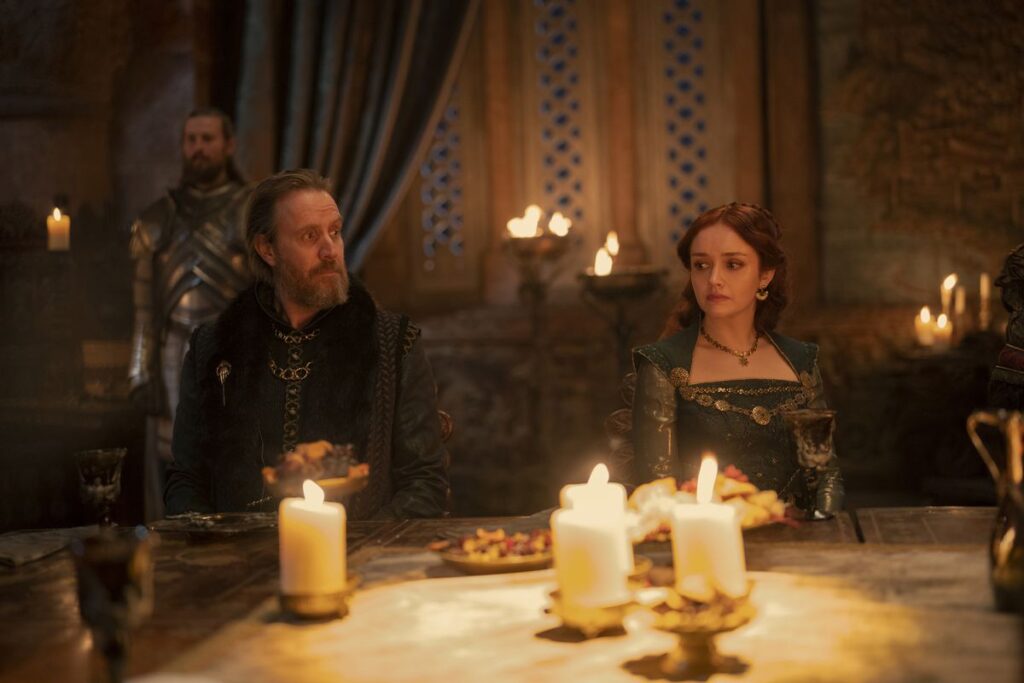A missing eye, a rotten tooth, a razor-thin scar standing out livid against pale skin. So much of “The Lord of the Tides” is structured around the injuries House of the Dragon’s cast have accrued throughout their troubled lives. Even the titular incident, a succession crisis within House Velaryon, is prompted by Lord Corlys (Steve Toussaint) suffering a grave wound in battle. We never see the wound; in fact, Lord Corlys doesn’t appear on screen at all, but knowledge of it sets into motion a struggle for power that costs a man his life and sets the royal family once more at each other’s throats. Think of it like Laura Palmer’s absence in Twin Peaks, the kind of vacancy that creates an entire story just in the negative space it leaves behind when it disappears.
This is a family that can’t stop hurting itself, and nobody has suffered more in that regard than King Viserys (Paddy Considine). However wrong he is to cling to the hope of an impossible status quo, however deluded he is as to his power to make the people he loves accept peace, it’s agonizing to see him so diminished, his body skeletal and sunken, covered in open sores, his mind addled by the opium tincture known as milk of the poppy. Even drawing breath, he’s as much a wound in the fabric of the kingdom as Lord Corlys.
The emotional wounds dealt back and forth across the divide between the two courtly camps are as present as the physical. When Rhaenyra (Emma D’Arcy) first sees Alicent (Olivia Cooke) upon returning to King’s Landing after a six-year absence, her hand flies at once to the scar on her forearm, mirroring a later scene in which she and Alicent clasp hands with apparently unfeigned warmth. Alicent rubs Rhaenyra’s arm and wrist as though in apology, and for the first moment since the time skip it seems as though some flicker of the romantic spark that animated their shared childhood could be reignited. Cooke and D’Arcy have an immediate chemistry strong enough that even the knowledge that this rapprochement is doomed can’t dent the exchange’s power. Their showdown in the Red Keep’s throne room is equally charged, the whole of the court looking on as they air their dirty laundry with ever-mounting venom. Rhaenyra’s open outrage is captivating, D’Arcy’s hawkish, aristocratic features perfectly suited to the towering contempt of a princess who’s never had to play petty games and so finds repellent the half-truths and evasions by which Alicent conspires to strip her sons of their inheritance.
Photo: Ollie Upton/HBO
At the royal dinner, which Viserys insists on attending in spite of his rapidly declining health, the king removes the gilded mask he wears at court to hide the open lesions eating through his cheek down to the muscle. He begs his family to see him not as their king but as a husband, a father, and a grandfather, and the social tactic he uses is the ghastly sight of his wounds, an unavoidable reminder of his mortality. The wound and old-age makeup applied to Considine are truly impressive, steering clear of the pitfalls of rubbery latex skin and unconvincing CGI. He looks like nothing so much as a medieval leper, entombed in his vast canopy bed behind the neglected study where he once toiled so happily over his model of Old Valyria, now covered in cobwebs.
That ancient freehold is yet another structuring absence, source of the dragons the royals covet and of the bloodlines they cling to and wield against one another to contest claims of legitimacy. There is an etiquette to the practice, a reliance on invoking these absences without mentioning them by name. When Vaemond Velaryon (Wil Johnson), chafing against the obvious lie of the parentage of Rhaenyra’s sons, dares to move past innuendo and into accusation, the dangers of probing at such a wound with one’s fingers swiftly become apparent.
Ironically, it’s only after Vaemond’s death that we see him treated with any tenderness. The arrogant, abrasive man is laid out by the silent sisters to be embalmed, the severed halves of his head laid reverently in line like something out of Hellraiser. We revere and memorialize our wounds because to admit they’re meaningless is to confront our own powerlessness, our insignificance in the face of entropy. And as Viserys draws what may be his last rattling, anguished breath, it’s hard not to think that his life of pain will become just another wound his descendants and widow can’t stop picking at, another absence into which they’ll project their own meaning.
It’s like the serving girl Diana, who at the episode’s start is presented shaking and in tears to Alicent, where she recounts her experience being raped by Prince Aegon. Alicent offers her false sweetness and comfort, then hush money. Close up that wound. Pretend you haven’t got it anymore. Except that once it’s dealt, it’s already too late. You can’t stop tonguing the hole where your tooth used to be. You can’t stop picking the scab. After this week it seems all of Westeros’ wounds are on the verge of being torn wide open.

